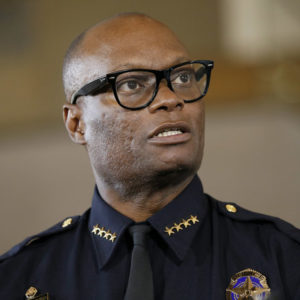On July 7, 2016, a gunman killed five police officers in downtown Dallas, where they had been protecting marching protesters. Then-Dallas Police Chief David Brown made the unprecedented decision to use a robot to send in explosives to stop the barricaded gunman. Brown gained national acclaim for his calm handling of the worst attack on law enforcement officers since September 11, 2001, and for his address during a nationally televised memorial service for the slain officers.
In an interview for “Listening to Leaders,” a new George W. Bush Institute book, Brown explains why leaders must listen to others, including those they have put in positions of trust. Below is an excerpt of his conversation with Bush Institute Executive Director Holly Kuzmich and Bush Institute Editorial Director William McKenzie.
Question: How do leaders, including police officers, establish trust with those they serve?
Brown: By doing things that build relationships. You build trust through showing people you care about them. This involves a lot of communication and has to be authentic. People will try to determine whether you are being genuine. Do you mean what you say?
Q: Leaders of large organizations can’t be aware of every situation. What did you learn about compensating for your limitations?
Brown: I learned that as a young lieutenant. I had a bit of an ego. I was not very respectful in trying to convince tenured lieutenants to pursue a particular idea. They let me know right away what they thought about my idea.
That situation helped me listen more to people who had different ideas than mine. I have been humbled quite a bit in my career and I never forgot that moment. It helped me make critical decisions.
Q: You had to communicate frequently and in a real-time way with Dallas residents on that tragic night in July 2016. How did you handle that high-stress situation?
Brown: I tried to reveal who I was as a person. I tried not to be robotic or just give the facts. I tried to talk from a personal standpoint. I was exhausted, but I was trying to be authentic.
I tapped into my internal beliefs. I shared my values as part of my communication strategy. They were formed by what I had seen work and what I had seen fail.
Q: You had a risky decision to make in sending in robots and explosives to end the standoff. How did you think about making that decision in a short timeframe and high-pressure environment?
Brown: I communicated with the SWAT team, and we went around several times about different strategies and potential outcomes. The group brought the strategy of using the robot and explosives to me. I didn’t create that idea.
That was like their last-ditch strategy because I had downplayed everything else. We were all exhausted, but I said, “Bring me something I can approve.” They brought this strategy.
It was risky, but I had to be willing to listen to other people. That was the first big step in a big decision: listen to people you respect in the organization. I was willing to allow them to be right and me to be wrong. I trusted people in the organization that I had appointed to leadership positions. I wanted their honest opinion on the best resolution, even if it was something that hadn’t been done before.
Doing nothing wasn’t something I could live with from a values standpoint. And I could not take more risk with officers and citizens. I couldn’t do that.
I decided this was the least risky recommendation as it relates to harming other officers. It was the most risky career-wise, if it didn’t work. If something had gone wrong using explosives, it would have been a horrible outcome. I was taking the responsibility to say, this is on me. If my career ends on this, let’s get going. I am willing to be criticized heavily for the decision.
Q: You also got national attention about challenging the community to get involved to make difficult situations better. What have you learned about engaging others to become leaders in in their own communities?
Brown: I believe in people getting involved to be the change they want to see, rather than expecting government to do all the work and being a spectator.
I really believed my government high school teacher, who talked about participatory democracy. That is why I joined the department. You have to affect change where you want to see it. That is why I decided I would become a police officer and save the world. Of course, that didn’t happen. But 30 years later I’m satisfied with my participation.
Participatory democracy is especially important at the local level. Change doesn’t happen without it.
ABOUT THIS ARTICLE
Reprinted by permission of Rowman & Littlefield from “Listening to Leaders: Values, Empathy, Humility, and Relationships,” edited by William McKenzie (copyright 2019). This is distributed by InsideSources.com.

